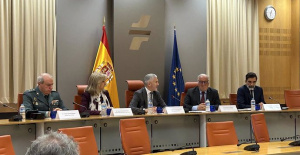AECID is in constant contact with the NGDOs and closely monitors the situation to adopt the necessary measures
MADRID, 1 Oct. (EUROPA PRESS) -
Mozambique has been a priority country for Spanish Cooperation for two decades and is the one with the most Spanish cooperators in its territory, with 99, but the work carried out by both the Spanish Agency for International Development Cooperation (AECID) and the Spanish NGOs in the north is being hindered by jihadist activity, they explain to Europa Press from the agency dependent on the Ministry of Foreign Affairs.
The province of Cabo Delgado, in the north of Mozambique and in which the Spanish Cooperation has been working for decades, has been the scene for five years of the activity of a group popularly known as Al Shabaab, although it has nothing to do with it. name that operates in Somalia, and that since 2019 has been claiming responsibility for its attacks on behalf of the Islamic State in Central Africa (ISCA).
The violence began in the city of Mocimboa de Praia and has spread over the years, particularly since 2019. The intervention in the summer of 2021 by Rwandan troops and an African Development Community mission Austral (SADC) allowed the Mozambican forces to recover a good part of the territory lost to the jihadists.
However, in recent months, these have extended their actions to other districts hitherto free of violence and also to the neighboring province of Nampula, and in recent weeks there have been several cases of beheadings, in addition to the murder of an Italian nun.
"The growing violence in Cabo Delgado has been affecting the development of Spanish Cooperation interventions for months," they acknowledge to Europa Press from the AECID, also lamenting the fact that now "the incidents are moving to the south." "The situation is very worrying", the sources admit, hence the fact that the AECID maintains "an attitude of alert before the deterioration of the situation".
"Logically, this situation is hindering or stopping the development of ongoing interventions to avoid risks", they add, specifying that some NGOs working in the country "have suspended activities in districts affected by the attacks to continue them in others, taking extreme precautions".
In this context of uncertainty and with a changing situation, the Spanish Cooperation Office in Maputo is in charge of monitoring the interventions that are being carried out as well as the situation of Spanish aid workers on the ground and maintaining contact with the organizations present in Mozambique.
From AECID, the existing security recommendations are transferred to the NGDOs that work in the country and also "the convenience of having a security management plan that includes an evacuation plan and satellite telephone, among others". In addition, "in the event of any alert or warning of possible attacks, the information is transferred to them immediately."
Likewise, a representative from the AECID office travels regularly to the province of Cabo Delgado, generally once a month, in order to visit the projects in progress and to meet with the personnel who work on them, as well as with authorities. from the province.
The Spanish Cooperation has been working in Cabo Delgado for more than 20 years and, despite the current insecurity situation, the province continues to be a priority area within the Spain-Mozambique 2021-2024 Association Framework and the commitment to inclusive development is maintained from this part of the country.
Since 2001, a support program has been financed for the provincial government to help strengthen the capacities of Cabo Delgado institutions through the training of public officials. In addition, in 2020 a subsidy of 200,000 euros was awarded to the Provincial Directorate of Agriculture to improve food security in the province.
On the other hand, AECID currently has several active agreements with NGOs that work in this region of northern Mozambique. Thus, in 2018, Doctors of the World, together with ONGAWA, were granted 2.5 million euros - to be executed in up to four years - for the reduction of chronic and acute malnutrition in this province.
Among the three projects approved for funding of €1.13 million in 2021 is also a food safety initiative carried out by Mundukide in Pemba, the provincial capital.
Last year, a €250,000 grant was also awarded to the World Food Program (WFP) to address the needs of families displaced by violence in Mueda, Nangade and Negomano districts.
Finally, AECID has financed the project 'Promotion of interreligious dialogue to contribute to the culture of peace in northern Mozambique' with the aim of contributing to the prevention of violent extremism in this part of the country.
Since the violent actions began in 2017, the ACLED project has recorded almost 1,500 violent incidents that have resulted in nearly 4,300 deaths, of which almost 1,900 have been civilians.
As a consequence, there are nearly a million displaced people. The UN had requested almost 390 million dollars to meet the humanitarian needs caused by this crisis, of which 53.4% have been received to date.

 Exploring Cardano: Inner Workings and Advantages of this Cryptocurrency
Exploring Cardano: Inner Workings and Advantages of this Cryptocurrency Seville.- Economy.- Innova.- STSA inaugurates its new painting and sealing hangar in San Pablo, for 18 million
Seville.- Economy.- Innova.- STSA inaugurates its new painting and sealing hangar in San Pablo, for 18 million Innova.- More than 300 volunteers join the Andalucía Compromiso Digital network in one month to facilitate access to ICT
Innova.- More than 300 volunteers join the Andalucía Compromiso Digital network in one month to facilitate access to ICT Innova.-AMP.- Ayesa acquires 51% of Sadiel, which will create new technological engineering products and expand markets
Innova.-AMP.- Ayesa acquires 51% of Sadiel, which will create new technological engineering products and expand markets The Prosecutor's Office requests 63 years in prison for Rato and a fine of more than 42 million euros
The Prosecutor's Office requests 63 years in prison for Rato and a fine of more than 42 million euros Marlaska puts more radars, surveillance on highways and motorists, and controls in the face of the increase in accidents
Marlaska puts more radars, surveillance on highways and motorists, and controls in the face of the increase in accidents Pedro Rocha, elected new president of the RFEF
Pedro Rocha, elected new president of the RFEF The PSC would win the elections with 40-47 seats and ERC is ahead of Junts, according to the CEO
The PSC would win the elections with 40-47 seats and ERC is ahead of Junts, according to the CEO How Blockchain in being used to shape the future
How Blockchain in being used to shape the future Not just BTC and ETH: Here Are Some More Interesting Coins Worth Focusing on
Not just BTC and ETH: Here Are Some More Interesting Coins Worth Focusing on The UA opens the call for the Impulso 2024 Awards for the best innovative business initiatives
The UA opens the call for the Impulso 2024 Awards for the best innovative business initiatives ALI, virtual assistant from Alicante, internationally recognized by the OECD
ALI, virtual assistant from Alicante, internationally recognized by the OECD Retrópolis brings the golden age of video games and computing to the UPV
Retrópolis brings the golden age of video games and computing to the UPV Looking for video games that value the neighborhoods of Valencia
Looking for video games that value the neighborhoods of Valencia A million people demonstrate in France against Macron's pension reform
A million people demonstrate in France against Macron's pension reform Russia launches several missiles against "critical infrastructure" in the city of Zaporizhia
Russia launches several missiles against "critical infrastructure" in the city of Zaporizhia A "procession" remembers the dead of the Calabria shipwreck as bodies continue to wash up on the shore
A "procession" remembers the dead of the Calabria shipwreck as bodies continue to wash up on the shore Prison sentences handed down for three prominent Hong Kong pro-democracy activists
Prison sentences handed down for three prominent Hong Kong pro-democracy activists ETH continues to leave trading platforms, Ethereum balance on exchanges lowest in 3 years
ETH continues to leave trading platforms, Ethereum balance on exchanges lowest in 3 years Investors invest $450 million in Consensys, Ethereum incubator now valued at $7 billion
Investors invest $450 million in Consensys, Ethereum incubator now valued at $7 billion Alchemy Integrates Ethereum L2 Product Starknet to Enhance Web3 Scalability at a Price 100x Lower Than L1 Fees
Alchemy Integrates Ethereum L2 Product Starknet to Enhance Web3 Scalability at a Price 100x Lower Than L1 Fees Mining Report: Bitcoin's Electricity Consumption Declines by 25% in Q1 2022
Mining Report: Bitcoin's Electricity Consumption Declines by 25% in Q1 2022 Oil-to-Bitcoin Mining Firm Crusoe Energy Systems Raised $505 Million
Oil-to-Bitcoin Mining Firm Crusoe Energy Systems Raised $505 Million Microbt reveals the latest Bitcoin mining rigs -- Machines produce up to 126 TH/s with custom 5nm chip design
Microbt reveals the latest Bitcoin mining rigs -- Machines produce up to 126 TH/s with custom 5nm chip design Bitcoin's Mining Difficulty Hits a Lifetime High, With More Than 90% of BTC Supply Issued
Bitcoin's Mining Difficulty Hits a Lifetime High, With More Than 90% of BTC Supply Issued The Biggest Movers are Near, EOS, and RUNE during Friday's Selloff
The Biggest Movers are Near, EOS, and RUNE during Friday's Selloff Global Markets Spooked by a Hawkish Fed and Covid, Stocks and Crypto Gain After Musk Buys Twitter
Global Markets Spooked by a Hawkish Fed and Covid, Stocks and Crypto Gain After Musk Buys Twitter Bitso to offset carbon emissions from the Trading Platform's ERC20, ETH, and BTC Transactions
Bitso to offset carbon emissions from the Trading Platform's ERC20, ETH, and BTC Transactions Draftkings Announces 2022 College Hoops NFT Selection for March Madness
Draftkings Announces 2022 College Hoops NFT Selection for March Madness



























